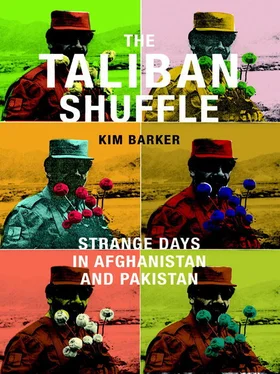But regardless of being a stranger in a strange land, a dog washer in a land of cat lovers, for the first time in Kabul, I started to have a social life, largely because of the influx of election workers, do-gooders, and journalists. A new restaurant opened called L’Atmosphère, where foie gras ran $9 and red wine flowed, where there was a pool, a large garden, cats, and rabbits. On some nights, I ate mystery meat at L’Atmosphère. On others, I crept across the alley from the Kabul Lodge to the Gandamack for dinner, braiding my hair to try to look like someone else, slouching to appear shorter, always worried I would be kicked out.
A new friend then invited me to a seminal event—my first Thursday-night Kabul party. Since Friday was the weekly Islamic holiday, Thursday night was the one night everyone had free. Just great—I had nothing to wear. I had only packed black tennis shoes, hiking boots, baggy jeans, baggy black pants, and assorted long Afghan shirts, the shortest of which hit me mid-thigh. So I opened up the metal trunk left by my predecessor, filled with maps, undefined power cords, vague equipment, and assorted leftover clothing. The only item that bore a resemblance to Western clothing was a baggy white T-shirt proclaiming TURKIYE on the front. I put on the T-shirt, jeans, and hiking boots. I looked in the mirror and performed a harsh self-assessment. I would never be described as a beautiful woman, but I could usually pass for cute and occasionally, when viewed in a certain light, even sexy. But I had not really taken care of myself since coming overseas. I hadn’t had a haircut in five months, and my split ends and slight curl gave me a frizzy aura. In my chronic hair wars, my gray roots were overtaking my brown ends. I had nothing to cover my under-eye circles, and I had definitely gained weight and acquired a bad complexion due to a diet of kebabs, rice, bread, and oil. On this night, I could perform little magic. I smoothed down my hair into a suitable helmet and put on lip gloss and mascara. At least I could show off my blue eyes.
We were dropped off at the guesthouse Afghan Gardens 1, not to be confused with the recently opened Afghan Gardens 2. I was slightly overwhelmed by the number of people jammed onto the concrete porch, the copious amounts of alcohol. The woman who ran the guesthouse wore a slinky black sleeveless dress. Another woman wore high-heeled boots, a long skirt, a fur-lined jean vest showing cleavage, and lounged on a couch, draped over some male friends. Hundreds of people were there; the U.S. embassy spokeswoman and her immediate boss even showed up. The entire party seemed optimistic about the future of Afghanistan and the impending election. And to celebrate, we drank alcohol and danced until 2 AM to songs like “Kiss” by Prince. By that point, it was agreed—Afghanistan was on a path to recovery, and Hamid Karzai, the well-spoken and well-dressed darling of the West, was the answer. Everyone hoped he would win.
I left the party at some point in the early-morning hours, well after most of the other foreigners had gone home but before the Islamic morning call to prayer. Drunk on red wine and paranoid about how I stacked up against the other women at my first big party, I realized that I needed to pay more attention to my clothes, my hair, my exercise routine, because against all logic, a social life in a war zone seemed entirely plausible. My friend’s driver dropped me at the Kabul Lodge, and my friend walked me to my room. He sat on my bed and started talking about motorcycles. I flipped on my laptop and scanned a story draft I had written earlier about a popular radio talk show on unrequited Afghan love. I closed one eye and stared three inches from the computer screen, performing the typical edit of the drunk journalist, concentrating hard on every word but comprehending little, all while wondering why my male friend was still here. After fifteen minutes, I shut down my laptop and stood up. My friend moved in for a kiss. Not a good idea—after all, I had the boyfriend half a world away, and my friend and I had both been drinking. So he left. I took another pass at my story, but the words still made more sense as letters than thoughts. I sent an e-mail to my boyfriend, Chris, who was still planning to move to India in a few months. I fell asleep.
In the morning, I awoke with a hangover fueled by cheap wine and guilt, mixed with a feeling of possibility. My social life had not hit a mud wall in Afghanistan. There were parties, a scene, places to wear little black dresses. There was potential here, even if that potential resembled a cross between a John Hughes high-school movie and Sinclair Lewis’s Main Street , given the small foreign community and the inevitable cliques, with do-gooders, guns for hire, and journos approximating brains, jocks, and goths. I knew what I needed to do. I needed to go shopping.
Zalmay Khalilzad clearly felt as optimistic, at least about the country. Not only was he the U.S. ambassador here—he also happened to be born and raised in Afghanistan. Khalilzad was not a normal diplomat, not a typical ambassador. Zal, as he was known, liked to get his hands dirty. During the large gatherings to pick an interim president in 2002, Khalilzad, then the Bush regime’s representative, had been accused of strong-arming the country’s former king into abandoning any political ambitions, paving the way for Karzai’s selection. Since then, Zal and Karzai seemed to have become best buddies; they talked on the telephone daily and frequently ate dinner together.
Zal liked control. He rode in the cockpit of the U.S. military C-130 Hercules whenever he traveled. “He likes to watch,” his press aide once told me. He didn’t just sit in the embassy and announce aid—he flew to the provinces and handed out windup radios to women himself. At meetings between Afghans and Westerners, Khalilzad translated, making sure everyone understood one another. At public events where, for diplomatic reasons, Khalilzad spoke English and used an interpreter, he corrected his interpreter’s translations. Zal also fed off the media like a personality feeds off a cult. He threw elaborate press conferences at the U.S. embassy, flashing a wide-angle grin and swept-back graying hair and often calling on reporters by name. Every journalist, from the fledgling Afghan reporter to the Norwegian freelancer, was invited and served sodas and water. Surrounded by attractive young female aides in hip, occasionally tight clothing, dubbed by some as “Zal’s Gals,” and always slightly late for any event, Khalilzad cultivated the air of a diplomatic rock star. He kept answering questions long after “last question” was called, long after his aides stole glances at their watches. “We have time,” Zal would say. “Let them ask more.” He always smiled, even when talking about tragedy.
But right before the election, Zal again flirted with controversy, accused of trying to fix it for Karzai, already a shoo-in. The other seventeen wannabe presidents had a better chance of being convicted of a felony than of winning an election—in fact, one later would be accused of murder, and others probably should have been. But Zal was accused of trying to make sure that Karzai won convincingly, of trying to persuade rivals to drop out. By now, Zal had earned himself a new colonial-style nickname: the Viceroy.
Regardless, Zal could not help himself. He seemed to lack a filter, and said whatever he thought whenever he thought it, and did whatever he thought was right, regardless of how it looked. In the embassy, some longtime State Department employees craved the return of a real ambassador, one who would stay in the background and not interfere. Zal didn’t care. He had helped shove through a messy Afghan constitution that set up a powerful central government and an even more powerful president, even though the country was used to neither. He had his own wing of advisers outside the typical embassy structure, the Afghan Reconstruction Group, made up of government employees and business executives who took leave from their jobs to help rebuild Afghanistan and charged the taxpayers overtime to do so. They were supposed to be an inhouse think tank; they soon became the Pentagon’s alternative to the United States Agency for International Development (USAID), the civilian foreign-aid wing of the U.S. government theoretically responsible for development projects. That these advisers were often ill versed in the ways of government and duplicated the roles of State and USAID was a serious problem. In some cases, someone in the Reconstruction Group would be working on an issue, and so would someone in the State Department, and so would someone in USAID, but because of infighting and resentments, the three did not talk to one another, and instead had to go up a chain to a supervisor who would then relay whatever concern down whatever chain was deemed necessary.
Читать дальше











